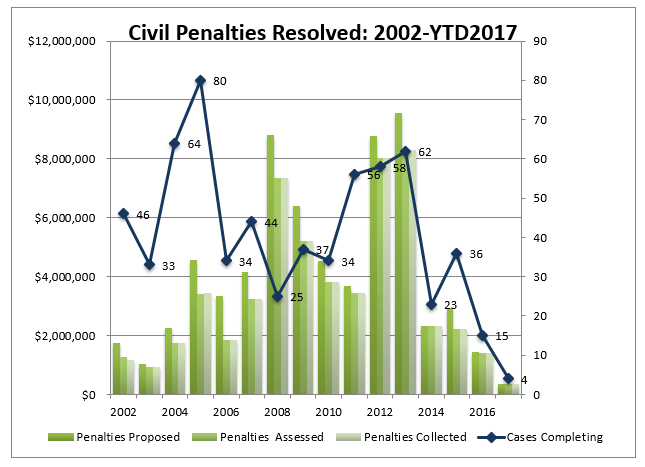
Holiday Bonus Episode: Safety Tips You Need This Season | Risk Matrix Episode 122
THE RISK MATRIX Cutting-edge podcast on occupational safety and risk management. Hosted by industry titans: JAMES JUNKIN, MS, CSP, MSP,…
A regular endeavor at Veriforce is keeping up with the activities of regulators. When it comes to OQ, PHMSA is the focus. Beyond getting a handle on what regulatory changes might be coming down the pike, it’s also useful to check periodically on recent enforcement actions. This gives us an idea where trouble spots might be that we need to give special attention in our discussions with clients. With that in mind, here’s an overview of PHMSA OQ enforcement actions reported for the months of June through September this year. (For more on PHMSA pipeline enforcement activity, see the PHMSA website.)
Proposed Civil Penalties and Compliance Orders – OQ
Among the actions initiated by PHMSA during the 4-month period we reviewed, proposed civil penalties for alleged OQ violations were included in three Notices of Probable Violation. Overall, PHMSA has the authority by law to assess up to a maximum of $200,000 per day, up to a total maximum of $2,000,000 for a related series of violations. Operators have a number of options to respond to a proposed civil penalty – e.g., contest the allegation, or provide information that might reduce the penalty – before PHMSA issues a Final Order.
The proposed penalties from smallest to largest are:
$17,200 – The notice cites the operator for failing to have a written OQ program in place (§195.509(a)) in 2013 at the time that employees and contractors began performing covered tasks. PHMSA acknowledges that the company’s OQ program was developed later and became operational in 2015.
$50,500 – This is based on the finding that the operator failed to have and follow a written qualification program that identified a specific covered task (§195.505(a)), namely removing a casing, which the PHMSA inspector observed contractors performing. In addition, the notice cites the operator’s failure to “ensure through evaluation” that the contractors performing this task were qualified (§195.505(b)). The company’s position was that it follows API Recommended Practice for Pipeline Operator Qualification (API RP 1161), which does not include removal of a casing as a covered task. PHMSA’s position is that API RP 1161 is not incorporated by reference in the OQ Rule, nor is API’s list an all-inclusive list of covered tasks. Further, PHMSA explains why removing a casing meets the four-part test for a covered task. In addition to the proposed civil penalty, the PHMSA notice includes a proposed compliance order requiring that the operator submit documentation to reflect changes to its OQ program covered task list and evaluation processes to correct the cited failings. (The operator has requested a hearing in this case.)
$63,900 – The issue in this case is failure of the company to follow its own written OQ program (§195.505). The PHMSA notice contends that the operator did not requalify an employee after the employee improperly performed a covered task – installing a pipeline cathodic protection rectifier – until 8 months later, following the PHMSA inspection when the issue was first noted. The operator’s OQ procedures call for requalifying an individual if their “performance is identified to be unsatisfactory, regardless of whether it has resulted in an incident.” (The company has requested a hearing in this case.)
A fourth Notice of Probable Violation includes a proposed compliance order on the alleged OQ infraction, but no penalty. According to the notice, the operator’s OQ plan “failed to require justification for the interval established for the review of each of the covered tasks” (§195.505(g)). The OQ plan sets a 36-month interval for all non-welding covered tasks. The proposed compliance order would oblige the company to amend its OQ plan to require “analysis of its difficulty, importance, and frequency” to justify each covered task’s requalification interval and to perform this analysis for all covered tasks. The company has contested this alleged violation, referring to its adoption of the Consortium on Operator Qualification recommendation on frequency of re-evaluations and noting the need for “national consistency” in these matters.
Notices of Amendment – OQ
During our review period, five Notices of Amendment (NOAs) were issued in which the written OQ program plans or procedures were judged inadequate. Once again, operators have the opportunity to respond to the NOA before PHMSA issues an Order Directing Amendment.
Deficiencies noted in these five NOAs include:
Warnings – OQ
The majority of the enforcement actions related to OQ during the June through September period involved warnings. A warning does not require a response, but the operator is “on notice” that it is subject to additional enforcement actions if the items noted are not corrected.
Most of the warnings cite issues related to recordkeeping, including:
An additional warning cites an operator for allowing an employee to perform covered tasks after his qualification expired and prior to requalification, and without the oversight specified in the operator’s span of control provisions.
Final Orders – OQ
Final Orders are issued as the final step in the enforcement process, after the operator has exercised its response options. From June through September, four Final Orders were issued involving OQ. No civil penalties were assessed in any of these cases. One OQ compliance order was issued: the operator, who had been cited for failing to ensure that individuals performing a covered task – span and exposed piping inspection – had the necessary knowledge and skills (§195.505(h)), was required to train its personnel in the revised procedures for this covered task. Two of the Final Orders included only a warning on the OQ infractions – both involving recordkeeping; in one, failing to provide records to inspectors showing that contractors performing covered tasks were qualified, and in the other, having no documentation to show which contractor performed each covered task on a day-to-day basis. In all three cases, the operators responded with information to show they had addressed the items cited.
A fourth Final Order withdraws the allegation of an OQ violation: failing to identify requalification intervals based on the factors specified in the operator’s written OQ program (§192.805(g)). In its response to PHMSA’s initial notice, the company pointed out that its OQ program details the process that its OQ service provider, Veriforce, uses to evaluate covered tasks and to establish requalification intervals. The Final Order withdrawing the allegation acknowledges that, “PHMSA allows operators to use ‘off-the-shelf’ operator qualification programs, such as the Veriforce OQ program…, provided that the operator maintains an adequate level of oversight over the implementation and management of the program.” It also notes that the company’s OQ program references the Common Covered Task (CCT) List developed by the Veriforce Common Task List Committee, which includes requalification intervals for each covered task based on difficulty, importance, and other factors. For covered tasks outside the CCT list, the company references industry guidance on requalification, as represented by ASME B31Q standard. The Final Order encourages the operator to amend its OQ plan “to include additional details concerning the methodology used by Veriforce and ASME to create the intervals within” its own plan.
Trends in PHMSA Enforcement Penalties
Stepping back and looking at PHMSA’s actions with regard to civil penalties for pipeline safety issues overall (not just OQ), it’s interesting to see that the dollar amount of penalties proposed, assessed, and collected over the last 15 years rose dramatically in 2012 and peaked in 2013, with ~$8.3 million collected, but then have dropped – even more dramatically – in recent years. Only 15 cases involving civil penalties were concluded in 2016, with $1.4 million collected. Based on where things stood at the end of the third quarter this year, the downward trend will almost certainly continue.

Only Veriforce delivers a comprehensive solution for PHMSA OQ Rule compliance that supports pipeline operators’ OQ processes from end to end. Learn more about how Veriforce unites software with value-added audit, consulting, and training services to maximize the overall effectiveness and defensibility of your OQ program.



THE RISK MATRIX Cutting-edge podcast on occupational safety and risk management. Hosted by industry titans: JAMES JUNKIN, MS, CSP, MSP,…

THE RISK MATRIX Cutting-edge podcast on occupational safety and risk management. Hosted by industry titans: JAMES JUNKIN, MS, CSP, MSP,…
We’ll send you practical and insightful supply chain risk management info that can benefit your business. Plus, important company updates that keep you in the loop.
